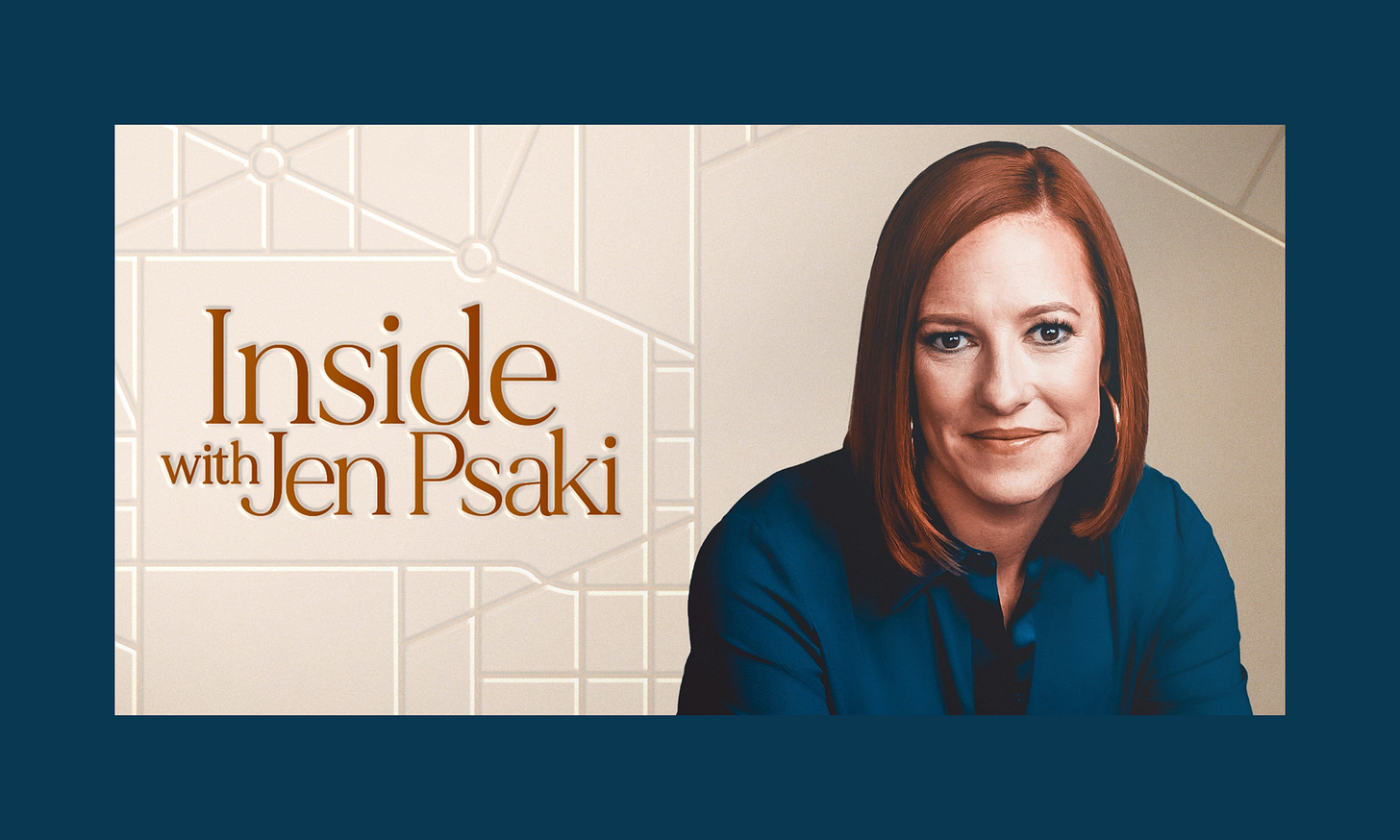Psaki: Democratic Messaging is Falling Short, not Connecting
Two political communication sources discuss it
Democratic political messaging is not operating at peak effectiveness and that has caught some party officials and observers attention, leading to frustrating critiques.
In his article, ‘What in the Hell?’: MSNBC Host Tears Apart Democratic Party, reporter Roger Anderson wrote about the problems at the Fort Worth Star-Telegram.
“The Democratic Party is facing historic low approval ratings and significant challenges following their 2024 election loss,” he reported.
“MSNBC host and former White House press secretary Jen Psaki recently shared her critiques of the party’s communication style, which she argued has failed to connect with voters. Psaki emphasized the need for clearer, more relatable messaging to regain Democrats' trust.”
The party has it wrong in its messaging and has to, she believes, “abandon complex rhetoric and instead focus on direct, genuine communication,” Anderson wrote.
Enough is Enough
"Rip the talking points up,” Psaki said. “Decide what you think authentically.” She is also not a proponent of the constant use of “authoritarianism” and “oligarchy,” arguing it isn’t in alignment with voter priorities.
"I feel like when Democrats, and including people who are on television in a variety of ways, were saying things like, ‘Authoritarianism is under threat and democracy is on the ballot,’ I think we were speaking in a manner that was so academic and Ivory Tower, it wasn't talking about a lot of the things people actually care about,” she told comedian Jon Stewart in an interview.
"So, I don't know that people voted against democracy, I think they voted in some ways against protection of status-quo and kind of the disconnected academic Ivory Tower elite language that is too often used by Democrats, sometimes on cable television."
She has extended the call for clearer, more relatable messaging to stop what hasn’t worked and do what may help build new relationships and win voters and elections.
“One of the biggest challenges in current Democratic messaging has been a focus on the hard facts and macrolevel data,” says Jeff Le, the managing principal at 100 Mile Strategies and a visiting fellow at the National Security Institute at George Mason University’s Antonin Scalia Law School.
“Telling someone that the economy is fine when they are not fine creates an environment of perceived gaslighting. Even if the trend at the high level is right, it doesn't mean it trickles down right away.
“Democratic messaging, to Ms. Psaki's point, should be focused on the individual in their shoes and where they are, not where they should be based on quantitative figures.”
Accurately reading the emotional component and responding in a trustworthy manner is what creates fertile ground for influence and persuasiveness.
“Acknowledging someone's challenge and meeting them with genuine empathy is important for opening the discussion and making potential room for open-mindedness and willingness to understand why the Democrats are offering a policy recommendation to try to remedy these challenges.”
Communication can’t be a user preference if its always to become successful.
“Political messaging can make or break campaigns,” says Ashwin Rajadesingan, an assistant professor of political communication at the University of Texas at Austin.
“For example, the (Kamala) Harris campaign touted their Infrastructure Investment and Jobs Act as a huge win, which it objectively was, but instead of focusing on its effect on communities, they focused on the net spend — a trillion dollars — on infrastructure through the Act when they needed to translate their legislative win into something more tangible for voters to remember.”
Psaki doesn't favor or see the value of rehearsed responses, calling them “ineffective and dismissive” and additionally, “complex rhetoric to deliver direct, genuine communication.”
There are risks being assumed with this approach. Psaki is an advocate for what will prove to be a more exciting emotional driver for agreement and buy-in with voters.
“Rehearsed responses come off as stiff, unrelated to the circumstance and appear insincere,” Le says. “The electorate are looking for action and fire. Cool, heavily focus-grouped answers is not that.”
Leaving canned answers behind, “leaves room for listening and learning, which is what constituents want,” Le asserts. “They want to be heard and they then want to leaders to act.”
He describes what can work better.
“I've found politicians who find an area of commonality such as shared experiences, similar aged children, comparable hometowns with their audience, allows for a stronger, closer bond, which makes the communication not only warm, but effective,” Le details.

Believability is Credibility and Trust
“I think the biggest risk to giving canned answers is that you come off as not being authentic. For a politician, that's a huge problem,” Rajadesingan says.
“But that doesn't mean that you go off the cuff all the time. There's a balance that you try to strike.
“This is also very candidate dependent,” he adds. “Biden, with his Scranton Joe image, may come off as more genuine using a more direct language compared to the more professional Harris.”

Psaki infers the use of regular use of “authoritarianism” and “oligarchy,” isn't helpful in winning over new voters and is damaging to the party's political aspirations.
Rajadesingan pushes back that those words are as significant an impediment to sound political messaging as Psaki said.
“I don't think buzzwords are the problem, though I agree that some of these phrases like ‘opportunity economy’ sounds rather academic,” he says.
“With authoritarianism’ though, a 2024 Pew research survey suggests that 1 in 4 Americans, even on the left, support such systems. So I don't think that line of attack went down well.
“To be fair, the Trump campaign also introduced buzzwords like ‘tariffs,’” Rajadesingan says. “Unlike the Harris campaign with ‘opportunity economy,’ they were able to define the term in the way they wanted, even if their definition wasn't necessary accurate.”
Le, however, disagrees on this point.
“The buzzwords are not helpful. They sound more like a college lecture,” he says.
“What is more interesting,” Le states, is communicating “about how these current administration actions have an impact in your daily life, your family's livelihood and security, and your community, with real world examples, such as egg prices, losing your government job or having slower checks mailed for social security.
“That's more important than buzzwords.
“It's a clear line between the government and how their decisions have negative or positive implications for how we navigate life, our priorities, and values.”
This newsletter normally publishes Tuesday, Thursday and Sunday, with occasional articles on other days. To advertise, link to your business, sponsor an article or section of the newsletter or discuss your affiliate marketing program, contact CI.








